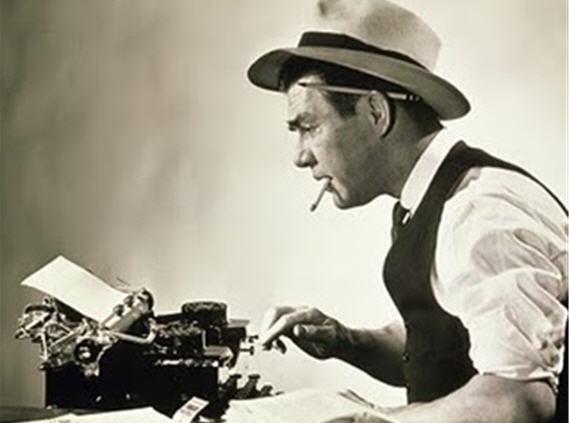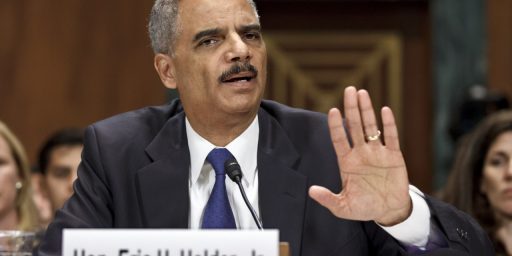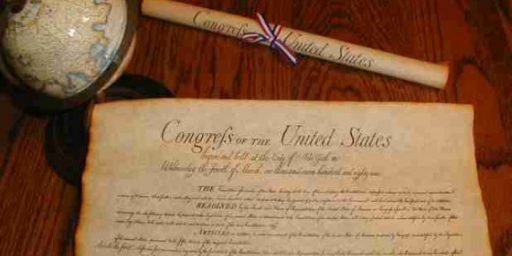Justice Department Won’t Force One Reporter To Testify, Faces A Choice On Another
The Justice Department won't force James Risen to testify in a legal investigation, but faces a new choice in a different case.
NBC News is reporting that the Justice Department will not seek to force a New York Times reporter to testify regarding a confidential source cited in a book he wrote regarding Iran’s nuclear weapons program:
Attorney General Eric Holder has decided against forcing a reporter for the New York Times to reveal the identity of a confidential source, according to a senior Justice Department official.
The reporter, James Risen, has been battling for years to stop prosecutors from forcing him to name his source for a book that revealed a CIA effort to sabotage Iran’s nuclear weapons program.
The government wanted Risen’s testimony in the trial of a former CIA official, Jeffrey Sterling, accused of leaking classified information.
But now, according to the Justice Department official, Holder has directed that Risen must not be required to reveal “information about the identity of his source.”
If the government subpoenas Risen to require any of his testimony, the official said, “it would be to confirm that he had an agreement with a confidential source, and that he did write the book.”
No final decision has been made about exactly how to proceed, the official said, but added the government “will no longer seek what he’s most concerned about revealing.”
The decision ends months of internal debate about how aggressive prosecutors should be in seeking Risen’s testimony. The federal judge overseeing the case, Leonie Brinkema of Alexandria, Virginia, gave the government until next Tuesday to declare how much he would be required to reveal in court.
Holder had earlier signaled he might decline to force Risen to reveal a source, telling a group of news media executives earlier this year that “As long as I am attorney general, no reporter who is doing his job is going to jail.”
A formal announcement is expected in the case relatively soon given the fact that the Justice Department faces a Tuesday deadline in revealing to the court whether it would seek to compel Risen to reveal his source. It was widely anticipated that, if the answer was yes, Risen would refuse to testify on the matter and that the Judge presiding in the case, which does not involve prosecuting Risen but does involve the leak itself, would be faced with the decision of whether or not to hold Risen in contempt and perhaps even place him in jail until he reveals his source. Because the Federal Court system, unlike the laws and courts of 49 of the 50 states, does not recognize any form of journalistic privilege on the issue of confidential sources, there would be no automatic protection available for someone in Risen’s position. Former New York Times reporter Judith Miller, for example, spent nearly three months in custody on contempt charges for her refusal to reveal the identity of a source related to the investigation of who may have leaked the identity of Valerie Plame as an active undercover CIA agent. On other occasions, of course, Judges have exercised their discretion and declined to jail reporters in similar situations, but there was no indication of what the Judge in the Risen case might do, and Risen had made clear that he would not reveal the identity of his source or sources for the information at issue in the book.
This news, somewhat ironically, comes at the same time that the Justice Department faces a similar choice in connection with a reporter for CBS News who had sought an interview with Osama bin Laden in the late 90s in the aftermath of the bombings at U.S. Embassies in Kenya and Tanzania:
Preet Bharara, the United States attorney in Manhattan, has recommended that Mr. Holder approve a subpoena for another journalist, a reporter for CBS News.
Mr. Bharara wants to force Richard Bonin, a longtime producer for “60 Minutes,” to testify next month at a terrorism trial over bombings by Al Qaeda in 1998. One of the two defendants, Khaled al-Fawwaz, is accused of running Al Qaeda’s media office in London. Prosecutors want Mr. Bonin to discuss his dealings with the group’s media office in an unsuccessful effort to interview Osama bin Laden in 1998, officials and others briefed on the case said.
Mr. Holder approved a subpoena for Mr. Bonin weeks ago, people briefed on the case said, but did so believing that prosecutors in Manhattan had worked out an arrangement in which Mr. Bonin would agree to testify. When it became clear that Mr. Bonin intended to challenge a subpoena, he rescinded his approval. Mr. Bharara’s office still wants the subpoena approved, but Mr. Holder is reviewing it.
Mr. Bonin said he had hired — at the network’s expense — the media lawyer David A. Schulz to object to a subpoena. Mr. Schulz said a reporter’s testimony about one conversation 16 years ago was unnecessary in a case in which the government has indicated that it has overwhelming evidence.
“The limited value of the testimony cannot justify the dramatic impact on Mr. Bonin’s ability to do his job, and on the increased risk to other journalists that will result by forcing a reporter to testify in this prosecution about things learned solely in the course of news gathering,” Mr. Schulz said.
Mr. Fawwaz, a citizen of Saudi Arabia, was indicted on charges including conspiracy to murder in connection with the Africa bombings, which killed more than 200 people. Prosecutors say he set up Bin Laden’s media office in London, helped recruit Qaeda trainees, and provided Bin Laden with a satellite phone.
His co-defendant is Nazih Abdul-Hamed al-Ruqai, who is more commonly known by his nom de guerre, Abu Anas al-Libi. United States commandoscaptured him in Tripoli, Libya, last year. He spent a week in military custody aboard a Navy ship in the Mediterranean before being arraigned in federal court.
Mr. Bonin is an Emmy-winning producer and an author of a book about Ahmed Chalabi, the former Iraqi exile who helped push the United States to war. In October, working with the CBS News reporter Lesley Stahl, he produced a “60 Minutes” segment titled “The War on Leaks,” which described Mr. Risen’s lengthy subpoena fight.
As I’ve noted before, the law tends to disfavor privileges that give certain classes of people the right not to testify on certain subjects regardless of how important that matter might be to a case before the Court. In the case of the journalistic privilege, the Supreme Court ruled more than 40 years ago in Branzenburg v. Hayes that the First Amendment does not require Courts to recognize any privilege for journalists who may be compelled to testify about sources or about information obtained during the course of their reporting that did not make it into a final story. Despite that, there is presently some form of a reporter’s privilege in 49 out of 50 states thanks either to judicial rulings based on state Constitutional law or legislatures that have adopted some form of a journalistic privilege. In recent years, thanks in no small part to the Holder Justice Department’s aggressive pursuit of journalists in the course of leak investigations, there has been some talk in Congress about passing some form of journalist shield law, but these efforts have largely come to naught. To no small degree, this has been because of both concerns about hampering legitimate investigations and the question of how to define what might be covered by such a law. One of the more interesting debates that has developed in recent years at the state law level, for example, has been the question of who qualifies as a “journalist” under the respective laws and therefore who is entitled to exercise the privilege in the first place. Different states have dealt with the law in different ways and no consistent rule appears to have developed even at this point. 2011 ,for example the New Jersey Supreme Court determined that bloggers who lack a connection to the “news media” are not covered by that state’s shield law. That same year, judge in Oregon ruled the same way. On the other side of the ledger, an Illinois Judge ruled in 2012 that certain bloggers could be covered under that states shield law, and there’s another recent case from New Jersey that found that a woman who blogged about local and county politics was protected by the state’s shield law. When Courts from the same state cannot even agree on this issue, its no surprise that the issue has remained unresolved.
In any case, as long as there is no Federal rule on this issue, we’re left with a situation whether the question is left in the hands of the Attorney General and whatever Federal Judge happens to be hearing the case in which a reporter happens to be a potential witness. Even if you disagree with the idea of a journalistic privilege itself, the idea of placing someone like a James Risen, Judith Miller, or Richard Bonin in jail for refusing to reveal a source seems like a waste of resources. Ultimately, the purpose of jailing someone for contempt in such as case is supposed to be to compel them to eventually testify, but in each of these cases it has been clear that the journalist in question was not going to do that, and would instead stand on principle. At some point, continuing to imprison someone like that stops being an effort to persuade them to talk and becomes punitive in nature, which raises a host of legal and constitutional objections that would seem to require the court to charge them with actual criminal contempt and hold a full trial, which rarely happens in these types of cases. Given Holder’s decision in the Risen case, it seems unlikely he’ll approve a subpoena for Bonin, but the fact that Holder has said he would not seek to imprison reporters who refuse to testify doesn’t mean that a future Attorney General won’t do just that. For that reason alone, the need for a consistent Federal rule on the issue seems to be quite apparent.







Whoever (allegedly Sterling) delivered the information to Risen pretty blatantly violated the Espionage Act, and I see no rationale for arguing that Risen and others like him should be insulated from criminal conspiracy charges under 18 U.S.C. 371.
The 1st Amendment is a bar on prior restraint; it is not a get out of jail free card. Screw contempt citations as a motivational tool. Put five years in federal prison and a subsequent lifetime as a convicted felon on the table, and let Risen decide what’s more important to him.